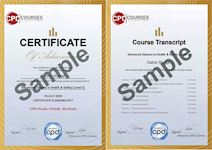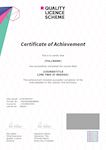Emotional Intelligence
Level 5 Advanced Diploma | *FREE PDF Certificate* |*100% Pass Rate* | 100 CPD Credits | *Free Management Skills Course**
CPD Courses
Summary
- Exam(s) / assessment(s) is included in price
- Tutor is available to students
Add to basket or enquire
Overview
Emotional Intelligence
Diploma of achievement in Emotional Intelligence QLS Level 5. Additional CPD Accredited Emotional Intelligence Certificate with 100 CPD points available without extra study. This Emotional Intelligence course comes with easy to understand e-learning study materials.
Emotional intelligence is an ability to recognize, understand and to manage the emotions of an individual and others’ emotions in positive way to get rid of stress, to communicate well and to overcome the conflicts and challenges.
Emotional intelligence is generally defined by four attributes; self-awareness, self-management, social awareness, relationship management. Self-awareness means one should have knowledge about his weaknesses, strengths and emotions rather self management means to control impulsive feelings and behaviours and managing the emotions in healthy ways while social awareness means understanding the concerns, needs and emotions of others on the other hand relationship management means developing and maintaining good relationships with others, inspiring and influencing others, working well in a team, and managing conflicts.
The unit defines the emotional intelligence with the history of emotional intelligence including a look at EI (Emotional Intelligence) Blueprint and VET process.
Unit also describes the concept of optimism, ABC’s of Optimism and the differences between pessimism and optimism.
Objectives
After the completion of this course learners will be able to:
- Understand what emotional intelligence means
- Learn techniques to understand, use, and appreciate the role of emotional intelligence in the workplace
- Define self-leadership and what it means on an individual level
- Understand what is Neuro Linguistic Programming
- Apply the cycle of anger
- understand how to manage the stress of training
- What conflict is and how it can escalate.
- The types of conflict and the stages of conflict.
- Practice developing these skills in a safe and supportive setting
Course assessment
You will be continually assessed throughout the course. Your assignment will be marked by your tutor and independently moderated. The feedback on your assignment will then be sent to you. On receipt of this, you may wish to contact your tutor to discuss the feedback.
Tutor Support
When you enrol on a course with CPD Courses you are allocated your personal tutor. Tutor’s help and support will be available throughout your studies with the college. He/she will assess your work and will provide you with regular feedback on your progress
Quality Licence Scheme
This Emotional Intelligence course is endorsed by the Quality Licence Scheme. The Quality Licence Scheme, endorses high-quality, non-regulated provision and training programmes.
Achievement
CPD
Course media
Description
Emotional Intelligence
Program Content
Unit 1- What Is Emotional Intelligence
The Emotional Intelligence unit covers the following topics:
- History of Emotional Intelligence
- Defining Emotional Intelligence
- EI (Emotional Intelligence) Blueprint
- Optimism
- ABC’s of Optimism
- Pessimism vs. Optimism
- VET Process
- Plus More
Unit 2-Understanding And Managing Emotions
The Emotional Intelligence unit covers the following topics:
- The Seven Human Emotions
- The Emotional Map
- Setting Your Personal Vision
- Creating Your Vision Statement
- Plus More
Unit 3-Self-Leadership
The Emotional Intelligence unit covers the following topics:
- Defining Self-Leadership
- Four Pillars of Self-Leadership
- Create a Personal Vision Statement
- Change Management
- Lifelong Learning
- Learning Plans
- Motivation for Optimists
- Creating a Motivational Climate
- The Value of Optimism
- ABC’s of Optimism
- Understanding Emotional Intelligence
- Applying Emotional Intelligence
- Plus More
Unit 4-NLP: Neuro-Linguistic Programming
This Emotional Intelligence unit covers the following key topics:
- Defining Neuro Linguistic Programming
- Understanding Common NLP Terms
- The NLP Presuppositions
- The Senses According to NLP
- Eye Accessing Cues
- Using Enriched Language
- Plus More
Unit 4-Strategies For Anger Management
This Emotional Intelligence unit covers the following key topics:
- About Anger
- The Five Dimensions of Anger
- The Costs of Anger
- What Are Your Anger Pay-Offs?
- Anger Process
- Understanding Trigger Thoughts
- Using an Anger Log
- Considering Our Ange
- Is Anger the Best Response?
- Distorted Thinking
- Understanding Behavior Types
- Managing Anger
- Sanctuary
- Relaxation Techniques
- Communication Tips and Tricks
- Active Listening Skills
- The Assertive Formula
- Plus More
Unit 5-Stress Management
This Emotional Intelligence unit covers the following key topics:
- Defining and Identifying Stress
- Ways to Look at Your Stress
- What is Stress About?
- Building a Solid Foundation
- The "Less Stress" Lessons
- Mental Strategies
- The Triple A Approach
- Stress at Work
- Stress Inventory
- Stress Logging
- Plus More
Unit 6-Conflict Resolution
This Emotional Intelligence unit covers the following key topics:
- What is Conflict?
- Benefits of Confrontation
- Preventing Problems
- Getting Focused
- The Three F’s
- Managing Anger
- Dealing with Problems
- Conflict Resolution Techniques
- Getting the Hang of Things
- Changing Yourself
- Dealing with Negative Feelings
- Plus More
Unit 7-Managing Pressure And Maintaining Balance
This Emotional Intelligence unit covers the following key topics:
- Causes and Costs of Workplace Pressure
- Benefits of Creating Balance
- Getting to the Heart of the Matter
- Facing Problems Head On
- Seeking Help
- Emotional Intelligence
- What is Optimism?
- Coping Toolkit
- Managing Anger
- Getting Organized
- Plus More
Unit 8-Creating Motivational Climate
This Emotional Intelligence unit covers the following key topics:
- Behavioral (Reinforcement) Theory
- Expectancy Theory
- McClelland’s Needs Theory
- Applying Your Skills
- Designing Motivating Jobs
- Plus More
Unit 9-Creating a Positive Work Environment.
This Emotional Intelligence unit covers the following key topics:
- What Does a Positive Environment Look Like?
- What Can I Do?
- Team Player
- Effective Workplace Relationships
- Working Cooperatively
- Managing Conflict
- Preventing Problems
- Dealing with Problems
- Meeting Management
- Conclusion
- Plus More
Course Benefits
- Full Tutor Support
- Self paced, no fixed schedules
- Available to students anywhere in the world
- 24/7 Access to the LMS ( Learning Management System )
- Easy to understand quality e-learning study materials
Course Material
All course materials are included in the course price. All your study material will be available on our learning management system for which you will get access once you are enrolled. The material can be downloaded and printed as well.
Our distance learning course materials are specially written for home study and contain a wealth of knowledge in easy to understand language. We use variety of media to help you learn. Your course may use any of the following different media which you can use from home or where ever you choose to study:
- Online course materials
- Question papers
- Additional Supporting Material
- Useful Links
Who is this course for?
Emotional Intelligence
- Business owners, managers, entrepreneurs,
- People seeking to expand their career opportunities
- Existing employees looking to develop their CPD
- Office workers at all levels
- Team Leaders and supervisors
- Entrepreneurs planning to start their own business
Requirements
Emotional Intelligence
There is no particular entry requirement.
Option 1
Emotional Intelligence Diploma QLS Level 5 endorsed by Quality Licence Scheme
Certificate Fee: £120 + postal charges
Option 2
Emotional Intelligence Diploma issued by CPD
PDF Certificate - FREE
Hard copy - £25 + postal charges
Option 3
CPD Accredited Certificate
(PDF format)=£30
(Hard copy)=£95 + postal charges
*Postage Charges: National £9, International £15
Career path
Emotional Intelligence
Questions and answers
Currently there are no Q&As for this course. Be the first to ask a question.
Reviews
Legal information
This course is advertised on reed.co.uk by the Course Provider, whose terms and conditions apply. Purchases are made directly from the Course Provider, and as such, content and materials are supplied by the Course Provider directly. Reed is acting as agent and not reseller in relation to this course. Reed's only responsibility is to facilitate your payment for the course. It is your responsibility to review and agree to the Course Provider's terms and conditions and satisfy yourself as to the suitability of the course you intend to purchase. Reed will not have any responsibility for the content of the course and/or associated materials.




